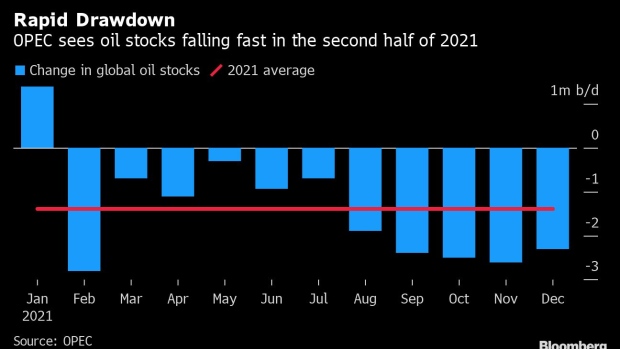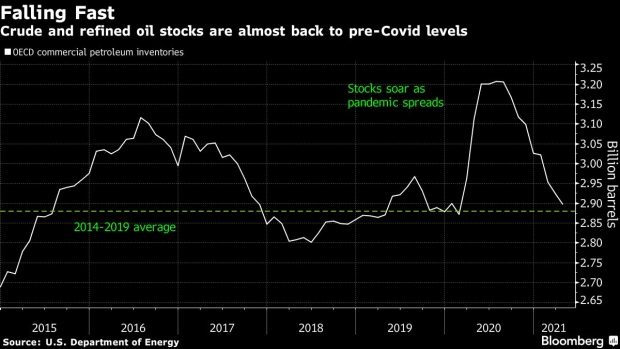Jun 1, 2021
OPEC+ signs off on July increase as market tightens
, Bloomberg News
OPEC is keeping this market in a deficit which supports a higher price: TD's Bart Melek
OPEC+ stuck to its plan to hike oil output in July, as Saudi Arabia’s energy minister struck a bullish tone about the global recovery.
The group will press ahead with an increase of 841,000 barrels a day in July, following hikes in May and June, according to delegates. As the market tightens, a more difficult decision looms for the group as it tackles the deficit that’s set to emerge later this year.
“The demand picture has shown clear signs of improvement,” Saudi Energy Minister Prince Abdulaziz bin Salman said as the meeting started. Russia’s Alexander Novak also spoke of the “gradual economic recovery.”
OPEC and its allies have spent more than a year rescuing prices from historic lows and only cautiously adding supply. Now the story is shifting: oil prices above US$71 are fueling inflation concerns and if OPEC doesn’t add more oil, there’s a risk the market becomes too tight, undermining the global recovery.

But the cartel is also embracing caution. Prince Abdulaziz echoed the concerns of his fellow delegates when he said there are still “clouds” on the horizon.
Iran’s potential return to international markets is one factor weighing on ministers’ decision-making. The impact of new variants of COVID-19 is another. And while there’s a wide deficit in the market to fill in the second half of the year, those two considerations could see some producers argue for a pause before further hikes.
“COVID-19 is a persistent and unpredictable foe, and vicious mutations remain a threat,” OPEC Secretary-General Mohammad Barkindo said.
After July, OPEC+ is scheduled to hold supply until April 2022, according to the deal signed a year ago to rescue producers from a bitter price war. While the agreement can be renegotiated -- and there’ll be pressure to do so as demand continues to recover -- it provides a fallback position for the group.
Tuesday’s meeting didn’t tackle the period after July, according to two delegates.
If the alliance doesn’t boost output later this year, prices will face further upward pressure, Fatih Birol, executive director of the International Energy Agency, told Bloomberg Television earlier on Tuesday.

“One thing is clear: in the absence of changing the policies, with the strong growth coming from the U.S., China, Europe, we will see a widening gap” between demand and supply, Birol said.



